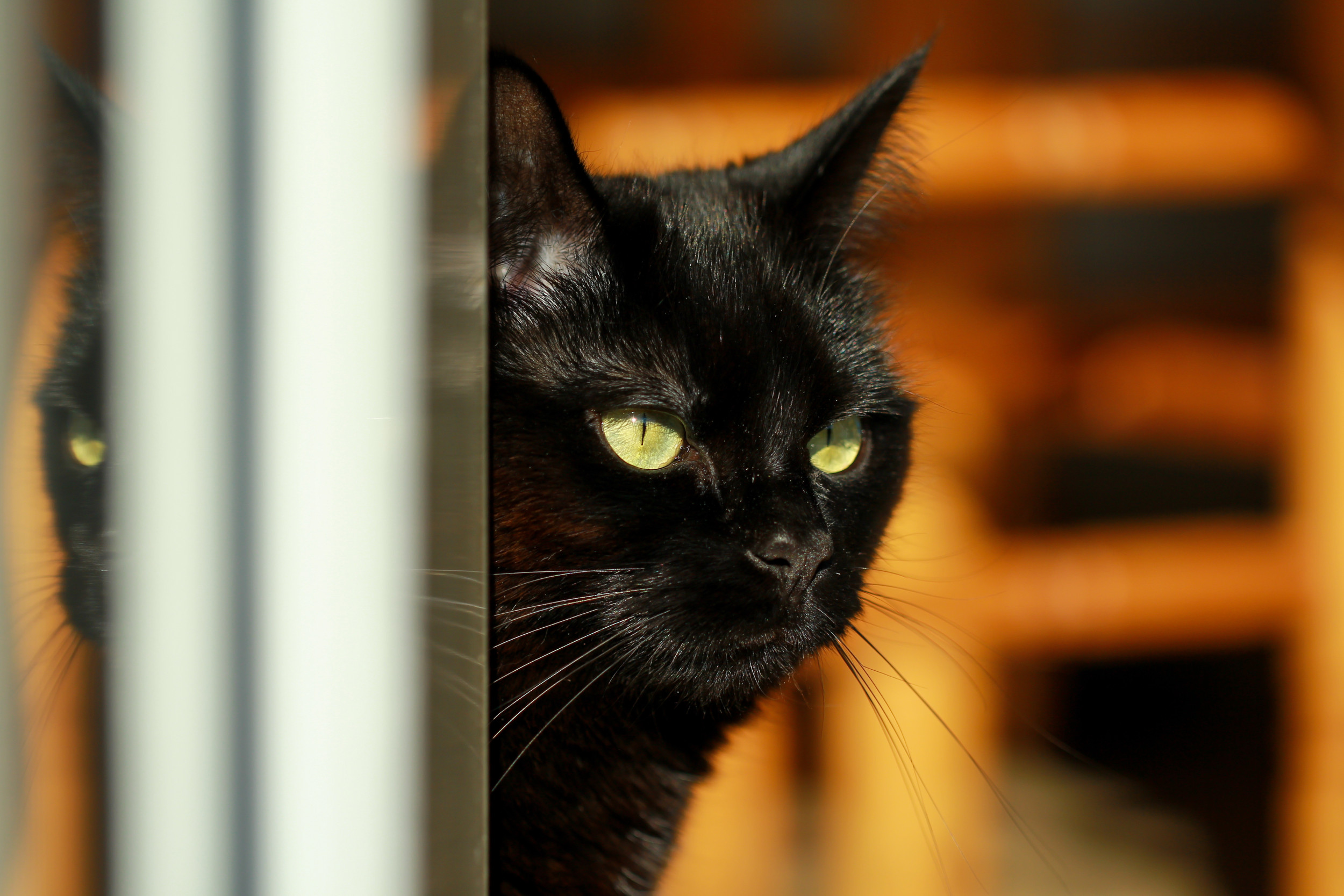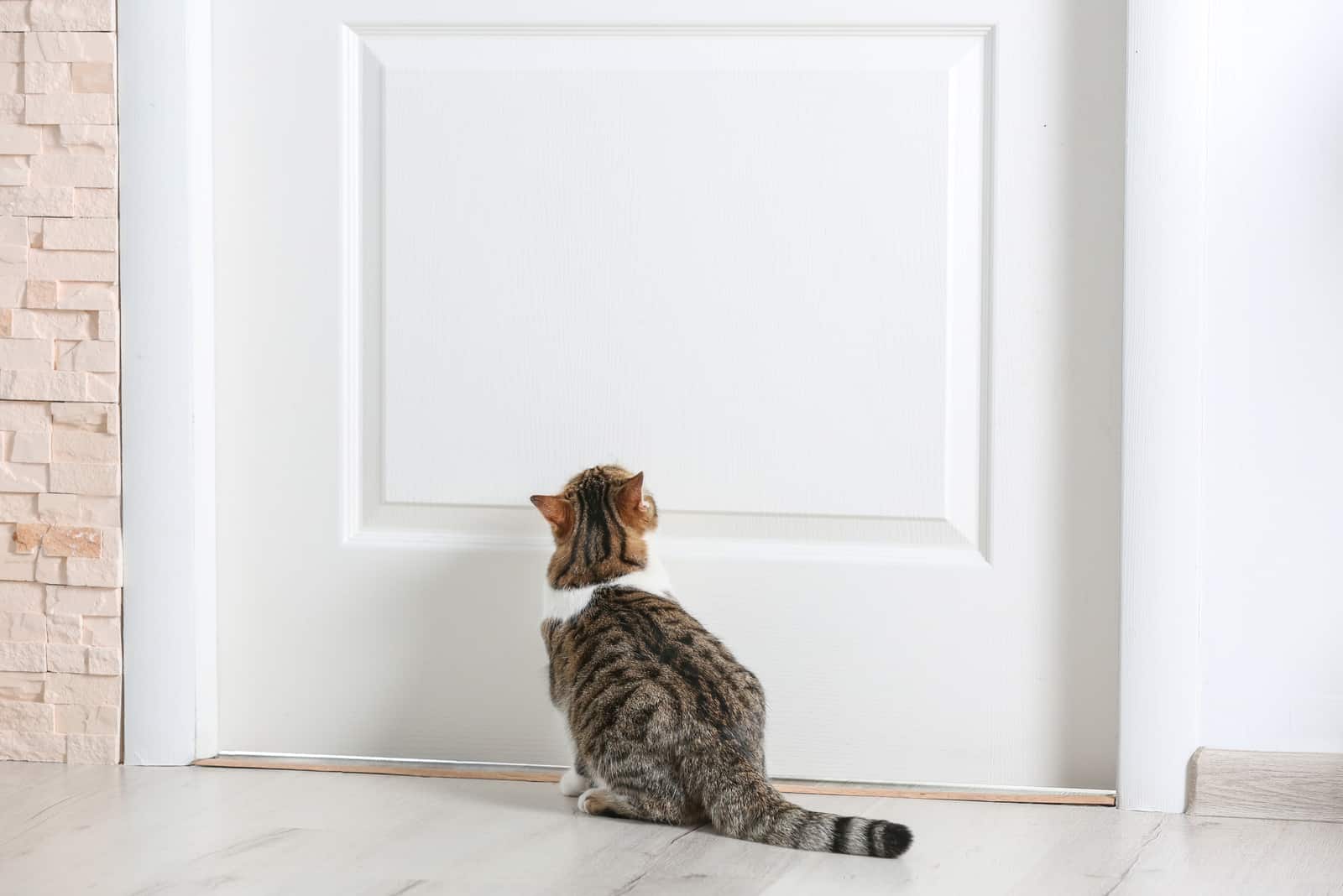The Cat’s Perspective: Cat Guards Bedroom Door

You might think your cat is just being a jerk, guarding your bedroom door like a tiny, furry bouncer. But believe me, there’s more to it than just wanting to annoy you. My feline friends and I have our reasons, and they’re not always about being a total diva.
Reasons for Guarding the Door, Cat guards bedroom door
Cats are creatures of habit and routine. They love their familiar spaces and often feel the need to protect their territory. The bedroom, with its cozy bed and comfy blankets, is often a prime spot for a cat to claim as their own. Think of it as their personal sanctuary.
- Territorial Instinct: The bedroom is a place where your cat feels safe and secure. They may guard the door to prevent other animals or people from entering their space, especially if they feel threatened or anxious.
- Security: Cats are naturally cautious creatures. They may guard the door to keep an eye on potential threats or to ensure their owner’s safety. This is especially true if they are sensitive to noise or unfamiliar people.
- Affection: Believe it or not, sometimes a cat guarding the door is just a way of showing you love! They might be seeking attention or simply want to be near you.
Behavioral Patterns
The way a cat guards the door can vary depending on their personality and the situation. Some cats might simply sit by the door, while others might pace back and forth or meow incessantly.
- Sitting: This is a common way for cats to guard the door. They’ll often sit directly in front of it, blocking the entrance. Think of it as their “don’t even think about it” stare.
- Pacing: Some cats might pace back and forth in front of the door, seemingly restless and anxious. This could be a sign of their heightened awareness and their need to keep an eye on things.
- Meowing: A cat might meow at the door, especially if they want to get your attention. This is a way of communicating their desire to be let in or to simply be near you.
Common Scenarios
Cats are most likely to guard the door when they feel vulnerable or insecure. Here are a few common scenarios where you might see this behavior:
- When you’re asleep: Cats often feel the need to protect their owners while they are sleeping. This is especially true if the cat is very attached to their owner.
- When strangers are present: Cats are naturally wary of strangers. They may guard the door to keep an eye on them or to prevent them from entering their territory.
- During specific times of day: Some cats might guard the door at specific times of day, such as when their owner is getting ready for work or when it’s getting dark outside. This is often a sign of their routine and their need for predictability.
Decoding the Behavior

Your cat’s sudden transformation into a door guardian can be quite a perplexing experience. One minute they’re napping in a sunbeam, the next they’re standing guard, laser-focused on the door, ready to pounce on any unsuspecting intruder. But fear not, my fellow cat-loving friends! This seemingly bizarre behavior is actually a window into your cat’s inner world, a way for them to communicate their needs and desires.
Understanding the subtle signals your cat uses is key to deciphering their intentions. Like a secret code, their body language can reveal whether they’re feeling playful, protective, or perhaps even a little territorial.
Body Language Cues
To decipher your cat’s intentions, you need to become a feline detective. Observe their body language closely, as it’s their primary mode of communication. Look out for these telltale signs:
- Flattened Ears: This indicates a cat is feeling threatened or anxious. They might also flatten their ears when they’re preparing to pounce, but the context will usually give you a clue.
- Dilated Pupils: This is a classic sign of arousal, which can be either playful or aggressive. If your cat’s pupils are dilated and they’re also hissing or growling, it’s a clear indication of aggression.
- Raised Tail: A raised tail with a slight quiver at the tip can indicate a playful mood. However, a stiff, upright tail with a puffed-up fur can signify aggression. Pay attention to the rest of their body language to get a better picture.
- Hissing or Growling: These are clear signs of aggression. If your cat is hissing or growling at the door, it’s best to give them space and avoid approaching them.
Distinguishing Playful Guarding from Aggression
Now, let’s delve into the crucial aspect of distinguishing between playful guarding and aggression. It’s important to understand that these two behaviors can look quite similar, but there are key differences to look for.
- Playful Guarding: This usually involves playful swats at the door, a happy chirping sound, and a generally relaxed demeanor. The cat might even rub against the door, indicating they’re simply curious and want to be involved.
- Aggressive Guarding: This involves more serious signs like flattened ears, dilated pupils, a stiff body posture, hissing, and growling. The cat might even swat at the door with force or attempt to scratch it.
Interpreting Your Cat’s Behavior
Remember, your cat’s behavior is a reflection of their feelings. If you notice your cat guarding the door, try to understand the context.
- Is there a new person or animal in the house? A new arrival can trigger territorial behavior in cats.
- Is there something unusual happening outside the door? A loud noise, a strange smell, or even a change in routine can make your cat feel anxious and protective.
- Is your cat seeking attention? Sometimes, cats will guard the door simply because they want to be the center of attention.
Managing the Behavior

Okay, so your cat’s become a door-guarding champion, right? You try to leave the room, and bam, they’re glued to the doorway like a furry, four-legged security system. It’s cute at first, but it can get old fast. Don’t worry, we’re gonna turn this feline fortress into a fun, friendly space for everyone.
Addressing the Underlying Causes
Let’s get to the root of the problem. Why is your cat guarding the door? Maybe they’re feeling insecure, bored, or just plain possessive. It’s time to give them a little love and attention.
- Boost Their Confidence: Cats love routine. Stick to a regular feeding schedule, playtime, and grooming routine. This helps them feel secure and less likely to guard their territory.
- Enrich Their Environment: Cats need stimulation! Give them plenty of toys, scratching posts, and climbing structures. Think of it as a cat-sized amusement park. The more engaged they are, the less likely they are to focus on the door.
- Adjust Their Feeding Schedule: Sometimes, food is the answer. If your cat is used to eating right before you leave, they might be guarding the door to ensure you don’t accidentally steal their meal. Try feeding them a bit earlier, so they’re not hungry when you’re about to head out.
